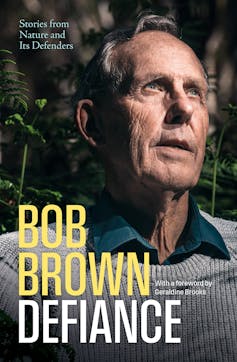‘We just have to be defiant’: irrepressible environmentalist Bob Brown reflects on a life of activism
- Written by The Conversation

Hobart’s Theatre Royal was packed to the rafters on a chilly October evening when the irrepressible nature warrior Bob Brown launched his latest book Defiance.
Given the state of the planet “we just have to be defiant”, Brown told the audience, as the image of activist Lisa Searle was projected onto the screen behind him.
Searle sat atop one of the world’s tallest flowering plants, a eucalyptus tree named Sentinel by its defenders, in Tasmania’s Styx Valley, perched there to prevent its destruction.
Review: Defiance: Stories from Nature and Its Defenders – Bob Brown (Black Inc.)
Writing is itself an act of defiance for Brown. Defiance is the latest and last in a long line of books. A collection of “musings about the human-induced plight of the planet”, it contains stories, calls to action, and odes to “our brilliant little planet”. It is written with thanks to “everyone who has ever lifted a finger to ward off its destruction”.
Some of these writings have appeared previously. Some are historical recollections. Many paint pictures of unique Australian environments and places, both protected and despoiled. But all of them decry “the escalating global overconsumption of Earth’s living resources”.
Communal action
Defiance calls for open resistance, taking the plunderers head on by “defying the laws that serve those who are exploiting the planet and its people”. But environmental activism is not just an act of defiance for Brown. It is also an antidote to depression.
He suffered from the “black dog” in the decade before he moved to Tasmania, where he fell in with local activists and, motivated by their ardour, soon found himself director of the nascent Tasmanian Wilderness Society. As history attests, Brown then plunged headlong into the ultimately successful campaign in the early 1980s to save southern Australia’s last great wild river, the Franklin.
Dance, love, read a book
There is an element of being up against the impossible in such defiance. Today, the scales have tipped even further against activists, with laws in Australia curtailing civil disobedience.
Following its stories of collective action, Defiance turns to what activists are up against: the brutes in suits, “as rich in dollars as they are poor in spirit”.
Brown has no hesitation in denouncing their unrelenting pursuit of growth, because Earth’s living resources cannot sustain it. He delivers blistering broadsides against capitalism, corporations, plutocrats and “greenophobia”, which he calls “the fear or hatred of environmentalists”.
Brown has been staring down corporate power as an activist, green politician, state leader, Australian senator and environmental advocate for half a century. In Defiance, the conservative media, the egoists, the billionaires who rule the world, and the politicians who are too compromised or too feeble to resist corporate power are called out as complicit.
But Brown also makes it clear that having fun is not incongruent with saving the planet. Indeed, he warns that “angst at the imminence of Earth’s destruction isn’t helpful”. Anxiety shouldn’t trip you up on the path to action, he warns. There is always time on hand to turn things around. You can still “dance, love, be loved”, or read a book by the river.
This is not to treat environmental destruction lightly, but to sustain the human efforts to address it. After decades of activism, Brown remains full of optimism in Defiance.
Defiant people make things happen, author Geraldine Brooks observes in her foreword to the the book. Indeed, the arc of the moral universe only bends towards justice if brave people make it so.
There is no creeping conservatism about the octogenarian Brown; if anything, he is more infectiously defiant than ever. His book concludes with a series of odes to wild places that reveal his close, indeed transpersonal, connection with nature. He wants everyone to share how it feels to see a wedge-tailed eagle rise on thermals, or the sun break through the clouds and light up a patch of forest in a distant valley.
“We need natural beauty,” he writes, because “our minds and bodies are made for wildness”.







